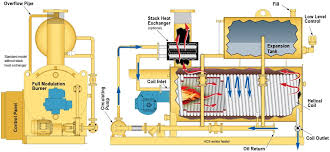
Nov . 08, 2024 09:03 Back to list
Hot Water Boiler and Heat Exchanger Efficiency in Thermal Systems
The Role of Heat Exchangers in Hot Water Boiler Systems
Hot water boiler systems are a fundamental component of modern heating solutions, providing the necessary warmth for residential and commercial spaces. These systems rely on the efficient transfer of heat to ensure optimal performance and energy savings. One of the key components that facilitate this process is the heat exchanger. Understanding the role of heat exchangers in hot water boilers can enhance our appreciation for their efficiency and functionality.
What Is a Heat Exchanger?
A heat exchanger is a device designed to transfer heat between two or more fluids while preventing them from mixing. In the context of hot water boilers, a heat exchanger allows the transfer of heat produced by combustion to the water circulating within the system. This is crucial for heating water effectively, enabling it to be delivered to radiators, underfloor heating systems, or domestic hot water taps.
Types of Heat Exchangers in Hot Water Boilers
Heat exchangers come in various designs, each suited to different applications
. The most common types used in hot water boiler systems include1. Fire-tube Heat Exchanger In this design, hot gases from combustion pass through tubes submerged in water. The heat transfer occurs as the hot gases raise the temperature of the surrounding water. This type is known for its robust construction and simplicity, making it popular in lower-pressure applications.
2. Water-tube Heat Exchanger Conversely, water-tube heat exchangers circulate water through tubes that are surrounded by hot gases. These systems are typically used in high-pressure applications and are known for their efficiency and ability to handle high temperatures.
3. Plate Heat Exchanger These consist of multiple thin, corrugated plates stacked together to create a series of channels. They offer a compact design and high heat transfer efficiency, making them suitable for installations where space is limited. Plate heat exchangers are often used in commercial hot water systems.
hot water boiler heat exchanger

Efficiency and Performance
The efficiency of a hot water boiler is heavily dependent on the heat exchanger's design and condition. A well-maintained heat exchanger will ensure maximum heat transfer, which translates to reduced fuel consumption and lower operating costs. In contrast, a fouled or worn heat exchanger can hinder performance, potentially leading to higher energy bills and premature system failure.
Manufacturers often incorporate advanced technologies such as finned tubes or enhanced surface designs in their heat exchangers to increase the surface area for heat transfer, further improving efficiency. Regular maintenance, including cleaning and inspection, is crucial to retain the performance of these components.
Importance of Material Selection
The materials used in fabricating heat exchangers are also essential to their effectiveness. Common materials include stainless steel, copper, and carbon steel. Stainless steel is favored for its resistance to corrosion, particularly in systems that may encounter water with varying pH levels. Copper, known for its excellent thermal conductivity, is often used in smaller, high-efficiency systems.
Environmental Considerations
As energy efficiency becomes a growing concern globally, the role of heat exchangers in hot water boiler systems is increasingly critical. By maximizing heat transfer and minimizing waste, these devices help reduce the carbon footprint associated with heating. Moreover, adopting newer technologies that utilize renewable energy sources will further enhance the environmental benefits of hot water systems.
Conclusion
Heat exchangers play an indispensable role in the functionality and efficiency of hot water boiler systems. Understanding their types, efficiency considerations, and material selection can empower consumers and professionals alike to make informed decisions. As we face challenges related to energy consumption and environmental impact, investing in high-quality heat exchangers and prioritizing maintenance will not only enhance comfort but also promote sustainability in our heating practices. The future of heating lies in technological advancements in heat exchanger design, ensuring that hot water boiler systems remain an efficient, reliable, and eco-friendly option.
-
High-Efficiency Commercial Oil Fired Steam Boiler for Industry
NewsJul.30,2025
-
High-Efficiency Biomass Fired Thermal Oil Boiler Solutions
NewsJul.30,2025
-
High Efficiency Gas Fired Thermal Oil Boiler for Industrial Heating
NewsJul.29,2025
-
High-Efficiency Gas Fired Hot Water Boiler for Sale – Reliable & Affordable
NewsJul.29,2025
-
High Efficiency Biomass Fired Hot Water Boiler for Industrial and Commercial Use
NewsJul.29,2025
-
High-Efficiency Biomass Fired Hot Water Boiler for Industrial Use
NewsJul.28,2025
Related PRODUCTS






















